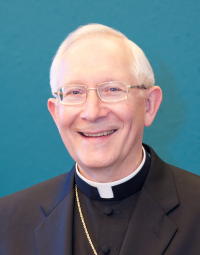
Archbishop Leonard P. Blair
On Aug. 13, we will celebrate for the first time on our liturgical calendar the Memorial of Blessed Michael McGivney, a native son and priest of the Archdiocese of Hartford and the founder of the Knights of Columbus. Now that he has been declared “Blessed,” his intercession can be invoked at Mass in our local Church, and we pray for the day when another miracle can be attributed to his intercession and he can be canonized as a saint for the ages.
For the priests of our archdiocese, Blessed Michael is one of our own, and we rejoice that, in the words of St. Paul, he “fought the good fight, finished the race, and kept the faith.” (2 Tm 4:7) I invite you to make an act of thanksgiving to God for the priests today who serve in our archdiocese and in your parish, and to say a kind word to them personally. During the pandemic, there have been many examples of priests who have shown patience, creativity, pastoral charity and zeal in the face of an unprecedented challenge. These are difficult times for Catholic clergy, given the many scandals that have rocked the Church and that have to be addressed honestly and forcefully, as we are doing. Yet the fact remains that the overwhelming majority of our clergy are not guilty of betraying the sacred trust of their ordination. They serve the Catholic people faithfully and well.
In an effort to remedy an excessive “clericalism” in the Church in the past, we have heard much in recent decades about the importance of ministry. “Ministry” has evolved as a more general word to describe a sharing by every baptized person in the work of Christ. Nevertheless, some distinctions have to be made if we are to be faithful to what has been established by Christ. In singling out the Twelve Apostles to be with him and to act in his name with authority, Jesus instituted the ordained priesthood as part of the Church’s very constitution for teaching, sanctifying and shepherding his flock. However, this office exists in order to foster, not exclude, the participation of laity and vowed religious in the work of Christ as his witnesses for the salvation of the world. Our Catholic Church, together with the Orthodox, teaches the divinely instituted mediation of a ministerial priesthood. Reformation churches do not. There are points of convergence, and scope for ecumenical dialogue, but a fundamental difference remains, with profound implications. Among other things, it explains why Catholics and Orthodox, unlike Protestants, do not practice eucharistic sharing or ordain women clergy. There is a spiritual fatherhood of priests that originates with Christ himself and his choice of the apostles from among the women and men who were his disciples. Rightly do we address priests as “Father,” and not just mister, reverend, friend, associate, colleague, co-worker and so on.
St. Paul tells the Corinthians: “Even if you should have countless guides to Christ, yet you do not have many fathers, for I became your father in Christ Jesus through the Gospel.” (1 Cor 4:15) In the family of the Church, what did “Father Paul” of Tarsus give to his spiritual children? His letters reveal the fatherly things he did for them: putting food on the table of word and sacrament; exercising authority for reconciling divisions; providing sound teaching and moral direction; giving courageous leadership amid daunting challenges; and protecting his spiritual children from danger.
All adults, whatever their state in life, are biologically, psychologically and spiritually meant to make a gift of themselves as either fathers or mothers according to their God-given sex. Those whose circumstances in life do not include marriage are also called to make a “gift of self ” that is in some way paternal or maternal, as the case may be, by the very fact of being a man or a woman. As we celebrate at Mass for the first time the liturgical Memorial of Blessed Michael McGivney, let’s remember that the body and blood of Christ are a priestly gift from his pierced heart on the cross. It is a gift that is made present by the exercise of Christ’s priesthood here and now by a man ordained to act in his very person. Let us pray for many more ordinations in our archdiocese to this sacred calling, for our need is great indeed.
